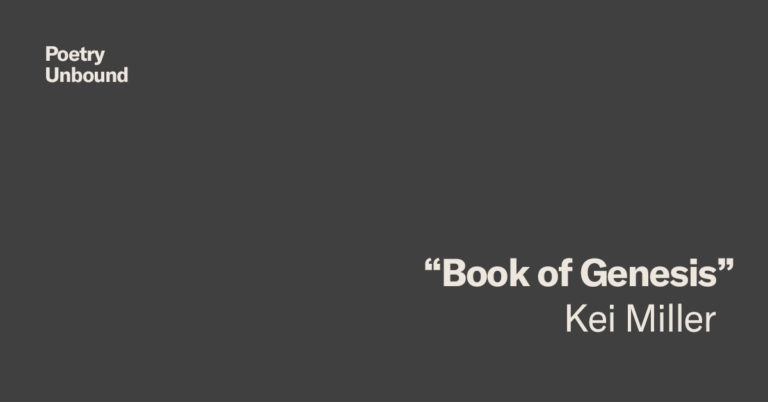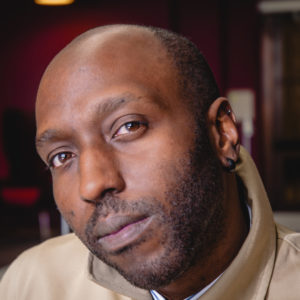Kei Miller
Book of Genesis
Kei Miller’s poem “Book of Genesis” asks us to imagine a God who makes things spring into life specifically for us. Just as the poet of Genesis proclaims, “Let there be,” Miller wonders what freedom and flourishing we’d find in imagining a “Let” pronounced not for the person others say we should be, but for the person we are.
A question to reflect on after you listen: How can you begin to let yourself flourish today, just as you are?

© All Rights Reserved.
Guest

Kei Miller is a professor of English and creative writing at the University of Exeter. His books of poetry include The Cartographer Tries to Map a Way to Zion, winner of the Forward poetry prize, There Is an Anger That Moves, and A Light Song of Light. His novels include The Last Warner Woman and most recently, Augustown.
Transcript
Pádraig Ó Tuama, host: My name is Pádraig Ó Tuama. I’m a poet from Ireland. And when I grew up, we learned poetry in Irish and English off by heart, every week, from the age of five. But when I was 11, I found myself picking up a piece of paper and realizing that I wanted to write a poem about things that couldn’t exist but still do exist. And poetry opened a door for me to speak about everything that I can see and everything that I can feel and to put it all onto a piece of paper.
[music: “Memoriam” by Gautam Srikishan]
Kei Miller’s poem, “Book of Genesis”:
“Suppose there was a book full only of the word,
let – from whose clipped sound all things began: fir
and firmament, feather, the first whale — and suppose
we could scroll through its pages every day
to find and pronounce a Let meant only for us —
we would stumble through the streets with open books,
eyes crossed from too much reading; we would speak
in auto-rhyme, the world would echo itself — and still
we’d continue in rounds, saying let and let and let
until even silent dreams had been allowed.”
The audacity of a person who would summarize an entire book of the Bible in one word: “let.” What is the “let” that could be just for me? Let me find it. It speaks of finding something deep inside yourself that will allow you to be your very own self and find ways in which you can flourish in the person who you are; not the person, perhaps, who other people tell you you should be, but the person who you are.
Years ago — I think I was 21, 22; I can probably remember. It was the summer of 1997, so I was soon to be 22. And I was just in the process of coming out to myself, really, and late at night I wasn’t able to sleep. So at about 2:00 in the morning, I just got out of bed and walked about three miles to the ocean. I was living in Dublin. And I walked there and walked out to the edge — and I was actually under a statue of Mary; there was a big statue of Mary out by this particular beach — and just shouted out, “Are there any other people like me around?” And I was so lonely and so desperate and felt so completely alone. And so, under her, I was shouting out for some kind of solidarity, some kind of companionship. And that can feel so lonely. Kei Miller is a gay man, and so, certainly, reading his poems, I thought, I know these stories, and I can go back into these stories and see them as something through which I can feel the human condition, rather than seeing them as a lens through which I have to castigate my own life.
As I’m looking at this poem — and I have looked at this poem so often, and I often land on a different word when I look at this one — but I am struck in the very first word: “suppose.” And that is a beautiful word of imagination, and it’s almost like Kei Miller is saying, “Just suppose. Maybe it isn’t even true that there is a book written for you, but suppose there is. What would that make possible?”
Kei Miller’s poem, “Book of Genesis”:
“Suppose there was a book full only of the word,
let – from whose clipped sound all things began: fir
and firmament, feather, the first whale — and suppose
we could scroll through its pages every day
to find and pronounce a Let meant only for us —
we would stumble through the streets with open books,
eyes crossed from too much reading; we would speak
in auto-rhyme, the world would echo itself — and still
we’d continue in rounds, saying let and let and let
until even silent dreams had been allowed.”
Lily Percy: “Book of Genesis” comes from Kei Miller’s book There Is an Anger That Moves. Thank you to Carcanet Press Limited, who gave us permission to use Kei’s poem. It was released on October 2008, and you can read it on our website, at onbeing.org.
Poetry Unbound is Tony Liu, Chris Heagle, Kristin Lin, Erin Colasacco, Serri Graslie, Eddie Gonzalez, and me, Lily Percy. Our music is composed and provided by Gautam Srikishan. And this podcast is produced by On Being Studios, which is located on Dakota land. We also produce other podcasts you might enjoy, like On Being with Krista Tippett, Becoming Wise, and This Movie Changed Me. Find those wherever you like to listen, or visit us at onbeing.org to find out more.
Books & Music
Recommended Reading
The On Being Project is an affiliate partner of Bookshop.org and Amazon.com. Any earnings we receive through these affiliate partnerships go into directly supporting The On Being Project.











Reflections